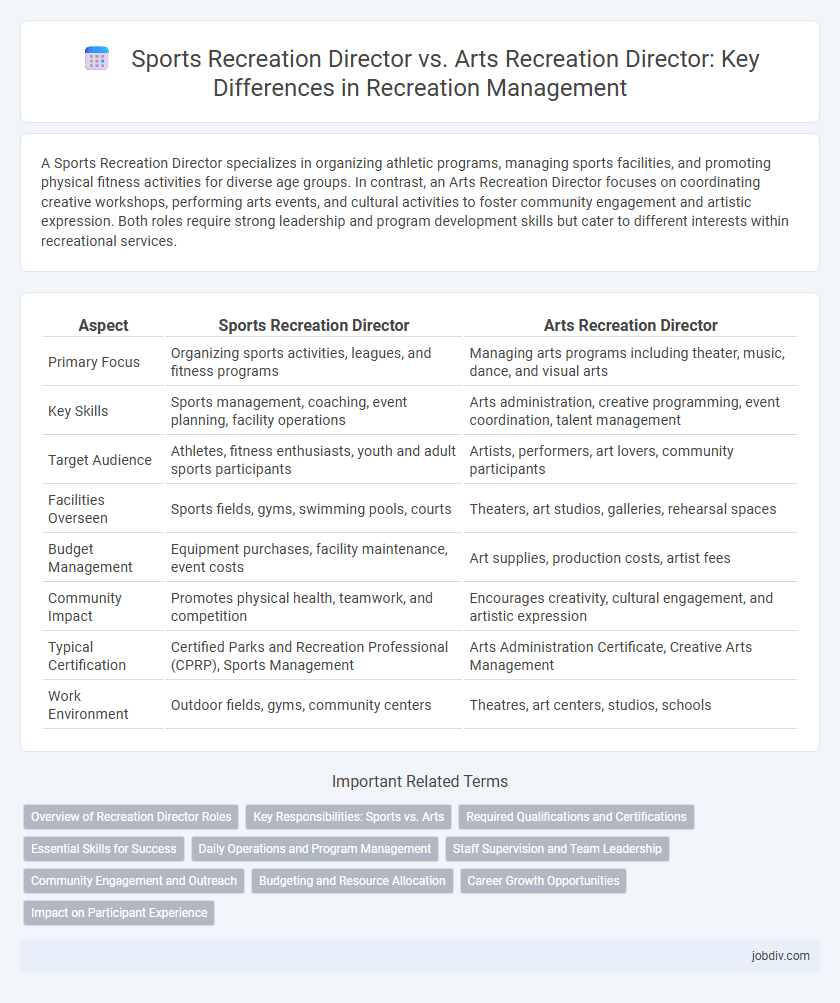A Sports Recreation Director specializes in organizing athletic programs, managing sports facilities, and promoting physical fitness activities for diverse age groups. In contrast, an Arts Recreation Director focuses on coordinating creative workshops, performing arts events, and cultural activities to foster community engagement and artistic expression. Both roles require strong leadership and program development skills but cater to different interests within recreational services.
Table of Comparison
| Aspect | Sports Recreation Director | Arts Recreation Director |
|---|---|---|
| Primary Focus | Organizing sports activities, leagues, and fitness programs | Managing arts programs including theater, music, dance, and visual arts |
| Key Skills | Sports management, coaching, event planning, facility operations | Arts administration, creative programming, event coordination, talent management |
| Target Audience | Athletes, fitness enthusiasts, youth and adult sports participants | Artists, performers, art lovers, community participants |
| Facilities Overseen | Sports fields, gyms, swimming pools, courts | Theaters, art studios, galleries, rehearsal spaces |
| Budget Management | Equipment purchases, facility maintenance, event costs | Art supplies, production costs, artist fees |
| Community Impact | Promotes physical health, teamwork, and competition | Encourages creativity, cultural engagement, and artistic expression |
| Typical Certification | Certified Parks and Recreation Professional (CPRP), Sports Management | Arts Administration Certificate, Creative Arts Management |
| Work Environment | Outdoor fields, gyms, community centers | Theatres, art centers, studios, schools |
Overview of Recreation Director Roles
Sports Recreation Directors oversee the planning and implementation of athletic programs, focusing on team sports, fitness activities, and community engagement to promote physical health. Arts Recreation Directors manage cultural and artistic activities, including visual arts, music, theater, and dance programs, fostering creative expression and cultural participation. Both roles require strong organizational skills, community collaboration, and resource management to enhance recreational opportunities tailored to diverse populations.
Key Responsibilities: Sports vs. Arts
A Sports Recreation Director primarily manages athletic programs, coordinates sports leagues, and oversees facility maintenance to ensure safe and effective physical activities. An Arts Recreation Director focuses on developing cultural and creative programs, organizing workshops, and curating events that promote artistic expression and community engagement. Both roles require leadership in budgeting, staffing, and community outreach but differ significantly in program content and participant interaction.
Required Qualifications and Certifications
Sports Recreation Directors typically require a bachelor's degree in sports management, physical education, or a related field, often complemented by certifications such as CPR, First Aid, and Certified Park and Recreation Professional (CPRP). Arts Recreation Directors usually hold degrees in arts administration, fine arts, or cultural management, with preferred certifications including arts education credentials or leadership programs specific to arts and culture sectors. Both roles demand strong organizational skills and experience in program development, but their certification focus aligns with the physical or creative nature of their programs.
Essential Skills for Success
A Sports Recreation Director excels in skills such as team leadership, event coordination, and knowledge of athletic programs, emphasizing physical activity and community engagement. An Arts Recreation Director requires creativity, program development expertise, and proficiency in promoting cultural activities to foster artistic expression. Both roles demand strong communication, organizational abilities, and a passion for enhancing participant experiences within their respective domains.
Daily Operations and Program Management
Sports Recreation Directors oversee daily operations including facility maintenance, scheduling athletic events, and managing coaching staff to ensure effective program delivery. Arts Recreation Directors focus on coordinating creative classes, managing artist instructors, and organizing community art events to foster cultural engagement. Both roles require strategic program management, budget oversight, and participant feedback analysis to optimize recreational offerings.
Staff Supervision and Team Leadership
Sports Recreation Directors oversee athletic program staff, ensuring effective team performance through strategic delegation, performance evaluation, and motivation tailored to competitive sports environments. Arts Recreation Directors manage creative personnel by fostering collaboration, guiding project development, and nurturing artistic talent to enhance cultural program delivery. Both roles require strong leadership and staff supervision skills but emphasize different team dynamics and goal orientation within recreational settings.
Community Engagement and Outreach
Sports Recreation Directors focus on organizing athletic programs that boost community participation through leagues, tournaments, and fitness events tailored to diverse age groups. Arts Recreation Directors prioritize cultural engagement by creating workshops, exhibitions, and performances that promote local artists and foster creative expression within the community. Both roles utilize targeted outreach strategies, including social media campaigns and partnerships with schools and community organizations, to maximize attendance and inclusive involvement.
Budgeting and Resource Allocation
Sports Recreation Directors manage larger budgets focused on equipment, facility maintenance, and event coordination to support high-impact physical activities, requiring strategic allocation for team sports and community leagues. Arts Recreation Directors allocate resources toward materials, studio spaces, and artist residencies, emphasizing creativity support with often more flexible, smaller budgets tailored to workshops and exhibitions. Effective budgeting in both roles necessitates balancing participant needs with program goals to optimize facility use and community engagement.
Career Growth Opportunities
Sports Recreation Directors often experience rapid career growth due to the high demand for organized athletic programs and community sports management, with opportunities to oversee large-scale events and work with diverse athletic organizations. Arts Recreation Directors grow their careers by curating cultural programs, managing arts facilities, and collaborating with artists and educational institutions, which can lead to specialized roles in cultural development and arts administration. Both paths offer strong advancement prospects, but Sports Recreation Directors may find faster promotion in competitive, high-visibility environments, while Arts Directors often advance through network-building and expertise in creative programming.
Impact on Participant Experience
Sports Recreation Directors enhance participant experience by promoting physical activity, teamwork, and competitive spirit, leading to improved health and social bonding. Arts Recreation Directors foster creativity, self-expression, and cultural appreciation, enriching emotional well-being and personal growth. Both roles optimize engagement by tailoring programs to diverse interests, thereby maximizing satisfaction and community involvement.
Sports Recreation Director vs Arts Recreation Director Infographic

 jobdiv.com
jobdiv.com